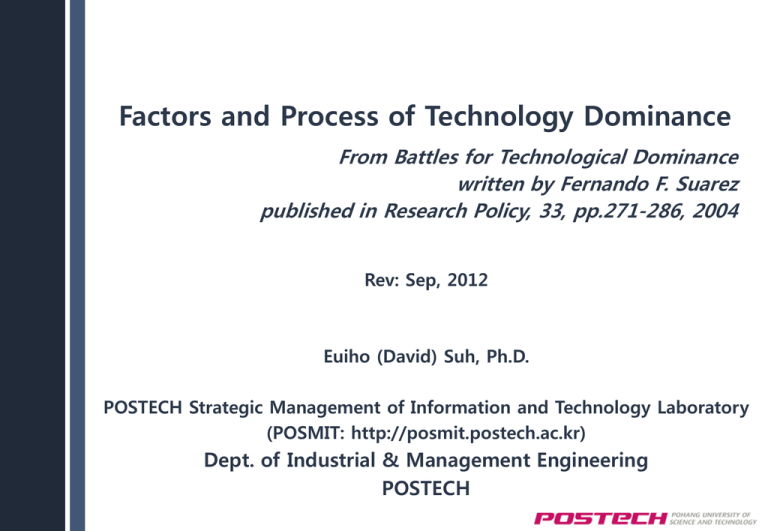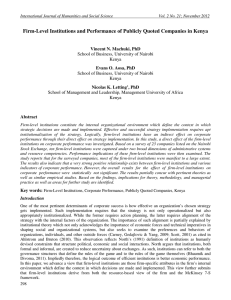Factors Associated with Technology Dominance
advertisement

Factors and Process of Technology Dominance From Battles for Technological Dominance written by Fernando F. Suarez published in Research Policy, 33, pp.271-286, 2004 Rev: Sep, 2012 Euiho (David) Suh, Ph.D. POSTECH Strategic Management of Information and Technology Laboratory (POSMIT: http://posmit.postech.ac.kr) Dept. of Industrial & Management Engineering POSTECH Contents 1 2 Factors Associate with Technology Dominance (1) Firm-level Factors (2) Environmental Factors The Dominance Process Factors Associated with Technology Dominance ■ Two Broad Groups of 8 Factors The environmental factors cannot only directly influence the outcome of a technological battle but can also act as moderators of some firmlevel variables. – No single factor of dominance is strong enough to tilt the balance in favor of a particular technology – Final outcome: Result of the interplay of several firm-level and environmental variables 3 Factors Associated with Technology Dominance – Firm-level Factors (1/4) ■ Firm’s Technological Superiority – Pure effect of technology – e.g., How well a given technology performs versus competing alternatives – Example • The large performance difference observed in the case of Sony’s Trinitron technology for TVs versus RCA’s Shadow Mask in the VCR industry [Sony’s Trinitron – relatively higher resolution] [RCA’s Shadow Mask – relatively lower resolution] In general, technological superiority will play a greater role when there are large performance differences between a technology and its competing alternatives. 4 Factors Associated with Technology Dominance – Firm-level Factors (2/4) ■ Firm’s Complementary Assets and Credibility – Assets, infrastructure or capabilities needed to support the successful commercialization and marketing of a technological innovation – Example • RC Cola: The first firm to commercialize canned cola • Coca Cola & Pepsi: Imitating this and beating RC Cola out of the market with their superior marketing capabilities and brand name recognition [RC Cola] [Coca Cola] 5 [PEPSI] Factors Associated with Technology Dominance – Firm-level Factors (3/4) ■ Firm’s Installed Base – Measure of the number of units of a particular type of system actually in use, as opposed to market share, which only reflects sales over a particular period – Not same with the total number of units sold at any given moment in time (Cumulative sales numbers) • Some of those units will typically be out of use because they have broken, gone missing, or been made obsolete – Example • Rapid market inroad of Nintendo’s NES 8-bit system Atari blocked that by making sure their 8-bit Atari 7800 was compatible with the large installed base of earlier Atari VCS videogames [Atari 2600 (1977)] Compatibility [Nintendo NES 8-bit (1985)] [8-bit Atari 7800 (1986)] 6 [Atari 5200 (1982)] Factors Associated with Technology Dominance – Firm-level Factors (4/4) ■ Firm’s Strategic Maneuvering – Timing of entry to the industry – Specific pricing strategy – Licensing and relationship with complementary goods and services – Marketing & PR (Public Relationship) to manage customers’ expectations 7 Factors Associated with Technology Dominance – Environmental Factors (1/5) ■ Regulation – Intervention from government or private institutions such as industry associations or standards bodies to mandate the use of a particular technology or tilt the balance in industry – Example • GSM (Global System for Mobile Communication): Mandated as the European standard for second generation wireless • Competing technologies: More efficient use of spectrum, Having technical advantages over GSM (e.g., CDMA (Code Division Multiple Access)) [The Differences Between GSM and CDMA] 8 Factors Associated with Technology Dominance – Environmental Factors (2/5) ■ Network Effects – Result of consumption complementarities where the utility derived by a consumer is affected by the total number of consumers subscribed to the same network – Upward shift of the demand curve with increases in the number of users in the network – Example • Microsoft’s operating system platform: Influence to a lot of applications • Application software writers’ first priority: Making programs which works well with the dominant platform Network Effect [Microsoft Windows] 9 Factors Associated with Technology Dominance – Environmental Factors (3/5) ■ Switching Costs – Costs associated with switching supplier – High switching costs Difficulty for a firm to steal customers away from rivals Loyal customer base – Example: Switching to new mobile phone • Effort needed to inform new telephone number to friends and relatives • Learning how to use the interface of a new mobile phone • Time loss caused by necessary paperwork to register to a new telecommunication provider [‘Cheon-Ji-In’ Keyboard] [‘Naratguel’ Keyboard] 10 Factors Associated with Technology Dominance – Environmental Factors (4/5) ■ Regime of Appropriability – Aspects of the commercial environment excluding firm and market structure, that govern a firm’s ability to capture the rents associated with an innovation – Example • Polaroid: Strongly protected by a whole array of patents (Aggressive defense against rivals) (Polaroid sued Kodak for trying to invent Polaroid’s patent • Sun filed a lawsuit against Microsoft charging the infringing the Java licensing agreement 11 Factors Associated with Technology Dominance – Environmental Factors (5/5) ■ Characteristics of the Technology Field – The number and relative power of each actor – The level of cooperation versus competition: Ability of a firm to reach agreement in the technological field – Examples • Open Standards: There is a significant support for “open standards” within the software developer community. In addition to the characteristics of the research community, the structure of the industry’s value system can have implications for the ability of the different sponsor firms to push for their technology alternatives. Research in industrial economics has shown that initial market structure along the value system can affect the success of firms’ standardization efforts. 12 The Dominant Process (1/6) ■ 5 Milestones in the Process of Technological Dominance – – – – – T0: The beginning of a technological field with an organization pioneering applied R&D TP: The time when the first working prototype emerges TL: The time of the first launching of a commercial product TF: The time when a clear front-runner appears TD: The time when one of the alternative designs becomes dominant All firm- and environmental-level factors are present in most of the phases and do play some kind of a role 13 The Dominant Process (2/6) ■ Phase I – R&D buildup (T0 – TP) – When the key characteristics of the technological field are determined – Key factors • Firm-level Factor: Complementary Assets and Credibility • Environmental Factor: Characteristics of the Technological Field As large and visible firms with generous research budgets will attract good researchers • Environmental Factor: Regime of Appropriability As it determines whether or not firms with important innovations can pursue their technological trajectories unchallenged by imitators 14 The Dominant Process (3/6) ■ Phase II – Technical feasibility (TP – TL) – When all firms are prompted to evaluate their research programs and assess whether or not they are in a position to fight the upcoming battle independently – Key factors • Firm-level Factor: Technological Superiority As it effects on the final outcome and may sometimes lead to the early emergence of a winning technology • Environmental Factor: Regulation As the leading technological trajectories have proved their feasibility but have not yet or only just reached the market that regulators intervene 15 The Dominance Process (4/6) ■ Phase III – Creating the market (TL – TF) – When an irreversible change of emphasis from technology to market factors happens, making any technological differences between the alternatives become increasingly less important as time goes by – Key factor • Firm-level Factor: Strategic Maneuvering (Entry Timing, Pricing, etc.) As, in terms of the pricing, the penetration pricing has the strongest effect because, when no firm has yet achieved the advantage of a large installed base, customers’ decisions are likely to be strongly influenced by price 16 The Dominance Process (5/6) ■ Phase IV – The decisive battle (TF – TD) – When increasingly large customer bases begin to have an important effect on customers’ decisions which is consistent with recent empirical findings – Suggesting that the benefits of a technology can only be observed after a certain critical mass of users has been achieved – Key factors • Firm-level Factor: Installed Base, Complementary Assets and Credibility • Environmental Factor: Network Effects As a firm with large installed base and strong assets and credibility can have important advantages in the final stretch to dominance 17 The Dominance Process (6/6) ■ Phase V – Post-dominance (TD onwards) – When a clear dominant technology has emerged in the market – Key factors • Firm-level Factor: Installed Base • Environmental Factor: Network Effects and Switching Costs As large installed base acts as a strong defense against potential challengers, particularly in situations of environments with strong network effects and high switching costs 18








